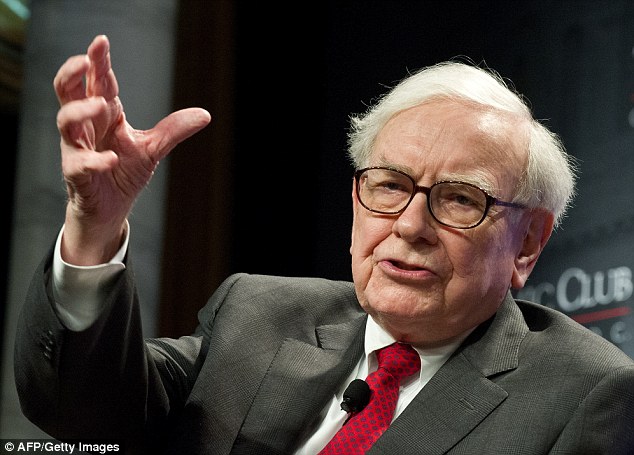Tracker and index funds offer simple low cost investing, where you ditch the costs and risks of trying to beat the market and follow it instead.
They are ideal for those who want to invest but don’t want the hassle of picking shares and want to avoid the often hefty costs using a traditional active fund manager involves.
Index funds can keep costs ultra-low and while they won’t beat the market neither should they fall far behind it – the idea instead is that what has been called passive investing is a slow and steady method wins the race.
So if you are thinking why should you pay for a fund manager’s Porsche when you can get cheaper investing – and often better than average performance – by just following an index, we take a look at some of the cheapest index trackers and how to invest.



Even the world’s most famous investor Warren Buffett has advocated trackers – stating that the instructions on the estate he will leave for his wife is to put it 90% into index funds
Beware fees and tracking error
There is little point in deciding to invest through index funds and then opting for one that carries high fees, so whatever you do check the costs.
Another drawback to trackers is ‘tracking error’. This is where a tracker fails to accurately follow the index. It is normally only marginal but some funds can drift wider over longer time spans.
Those with the highest charges often have the worst tracking error: the effect of fees makes it impossible to keep up.
Another danger is that simple index funds hold companies proportionally to their size. Sometimes companies and sectors become huge, making up a big chunk of a stock market – leaving tracker investors highly exposed to individual stocks or sectors, as happened with banks in 2007.
The best and cheapest tracker funds and ETFs
Below, we list some of the UK’s cheapest low-cost list the cheapest passive funds across investors’ most popular sectors including UK, UK Government bonds (Gilts), global, US, Europe-ex-UK and Japan, highlighting each one’s ongoing charges.
The ongoing charge is a better indication of the real cost than the annual management fee, taking all administration and dealing charges into account.
But you also need to consider the overall cost of investing, which includes any dealing fees and platform charges.
For more information, read our guide on how to choose the best (and cheapest) DIY investing Isa.
Mutual index funds versus ETFs
The list features the cheapest traditional passive mutual funds as well as exchange traded funds (ETFs). Both are very low cost compared to active funds where the fund manager picks investments with the aim of trumping a market index.
The main difference between the two passive types is that ETFs are listed on stock exchanges and therefore trade throughout the day like a common stock; a mutual fund has its net asset value calculated once at the end of every day and can only be bought then.
This means ETFs have greater flexibility – or are more liquid in investment terms – but choosing these over a passive mutual fund won’t really make much of a difference if you do not buy and sell investments often.
Trackers may be cheaper to buy and sell compared with ETFs if you can find a platform that doesn’t charge for fund dealing, as ETFs usually incur a share dealing charge.
It is also worth mentioning that some brokers have secured discount prices for certain funds, so it is worth having a look across the different investment platforms for the cheapest deals.
UK – FTSE 100
Cheapest index tracker: Vanguard FTSE 100 Index: 0.06 per cent ongoing charge.
Cheapest ETF: iShares Core FTSE 100 UCITS ETF and HSBC FTSE 100. 0.07 per cent ongoing charge.
UK – All Share
Cheapest index tracker: iShares UK Equity Index, Fidelity Index UK: 0.06 per cent ongoing charge.
Cheapest ETF: SSGA – SPDR FTSE UK All Share UCITS ETF: 0.2 per cent ongoing charge.
UK – Gilts
Cheapest index fund: Legal & General All Stocks Gilt Index Trust (tracks the FTSE Actuaries British Government Index- Linked All Stocks index), Vanguard UK Government Bond Index (tracks the Barclays Capital Global Aggregate U.K. Government Bond index): 0.15 per cent ongoing charge.
Cheapest ETF: Vanguard – UK Gilt UCITS ETF (tracks the Bloomberg Barclays Sterling Gilt Float Adjusted index): 0.12 per cent ongoing charge.
Global
Cheapest index fund: The L&G International Index Trust and Fidelity Index World tracks the FTSE World ex UK and MSCI World indices respectively. Both indexes invest in stocks from developed countries (the former excludes UK). Both funds levy an ongoing charge of 0.13 per cent.
Cheapest ETF: Vanguard FTSE All World UCITS ETF is the cheapest fund investing in the broadest possible basket of the world’s stock markets comprising of shares from both developed and developing economies. The funds ongoing charges is 0.25 per cent.
US- S&P 500
Cheapest index fund: Fidelity Index US and HSBC American Index: 0.06 per cent ongoing charge.
Cheapest ETF: Source S&P 500: 0.05 per cent ongoing charge.
Emerging Markets
Cheapest index fund: Fidelity Emerging Markets Index (tracks MSCI Emerging Markets index): 0.2 per cent ongoing charge.
Cheapest ETF: Amundi MSCI Emerging Markets UCITS ETF: 0.2 per cent ongoing charges.
Europe – ex UK
Cheapest index fund: iShares Continental European Equity Index (tracks FTSE World Europe ex UK): 0.09 per cent ongoing charge.
Cheapest ETF: The cheapest tracker in this category are the HSBC Euro Stoxx 50 UCITS ETF and Source Euro Stoxx 50 UCITS ETF with an ongoing charge of 0.05 per cent, but it only tracks the performance of 50 large, blue-chip European companies operating within Eurozone nations.
The Vanguard FTSE Developed Europe ex UK UCITS ETF, tracks a broader range of European stocks. It levies an ongoing charge of 0.12 per cent.
Japan
Cheapest index fund: Fidelity Index Japan (tracks the MSCI Japan index): 0.1 per cent ongoing charge.
Cheapest ETF: Amundi JPX-Nikkei 400 UCITS ETF: 0.18 per cent ongoing charge.
Funds that do it all for you
Vanguard offers a range of LifeStrategy portfolios that put your money into a range of index funds and bonds from around the world.
These can be 100 per shares from around the world, or step down in a mixture of shares and bonds from 80 per cent shares / 20 per cent bonds to 20 per cent shares / 80 per cent bonds.
The ongoing charges figure is 0.24 per cent
> The Minor Investor column on how the LifeStrategy works.
Tracker funds and efficient markets
Tracking is far more effective in ‘efficient’ markets, such as larger companies in the UK and the US.
In countries such as these, financial systems ensure that everything investors need to know is in the public domain and well reported.
There are also big investing industries generating huge amounts of research on the biggest companies and employing a small army of people trying to profit from their shares.
Therefore, it is harder for a fund manager to seek out bargain stocks that have been overlooked and he or she will struggle to beat the index.
But in less efficient markets, such as emerging markets and Asia, or niche areas like smaller companies, stock-picking fund managers find it easier hunt out gems and therefore find it easier to beat trackers.You still need to spend some time picking a good manager though.